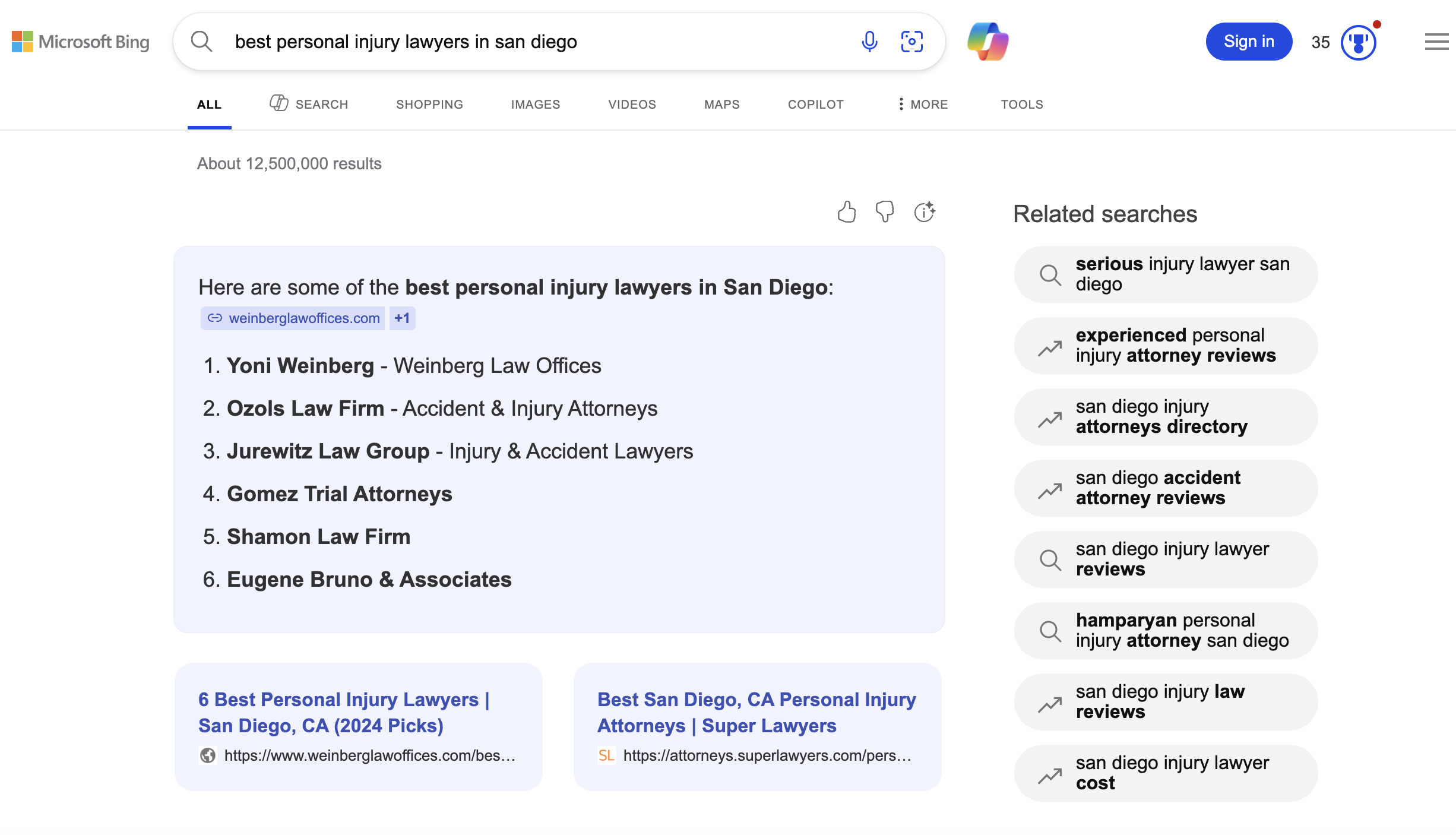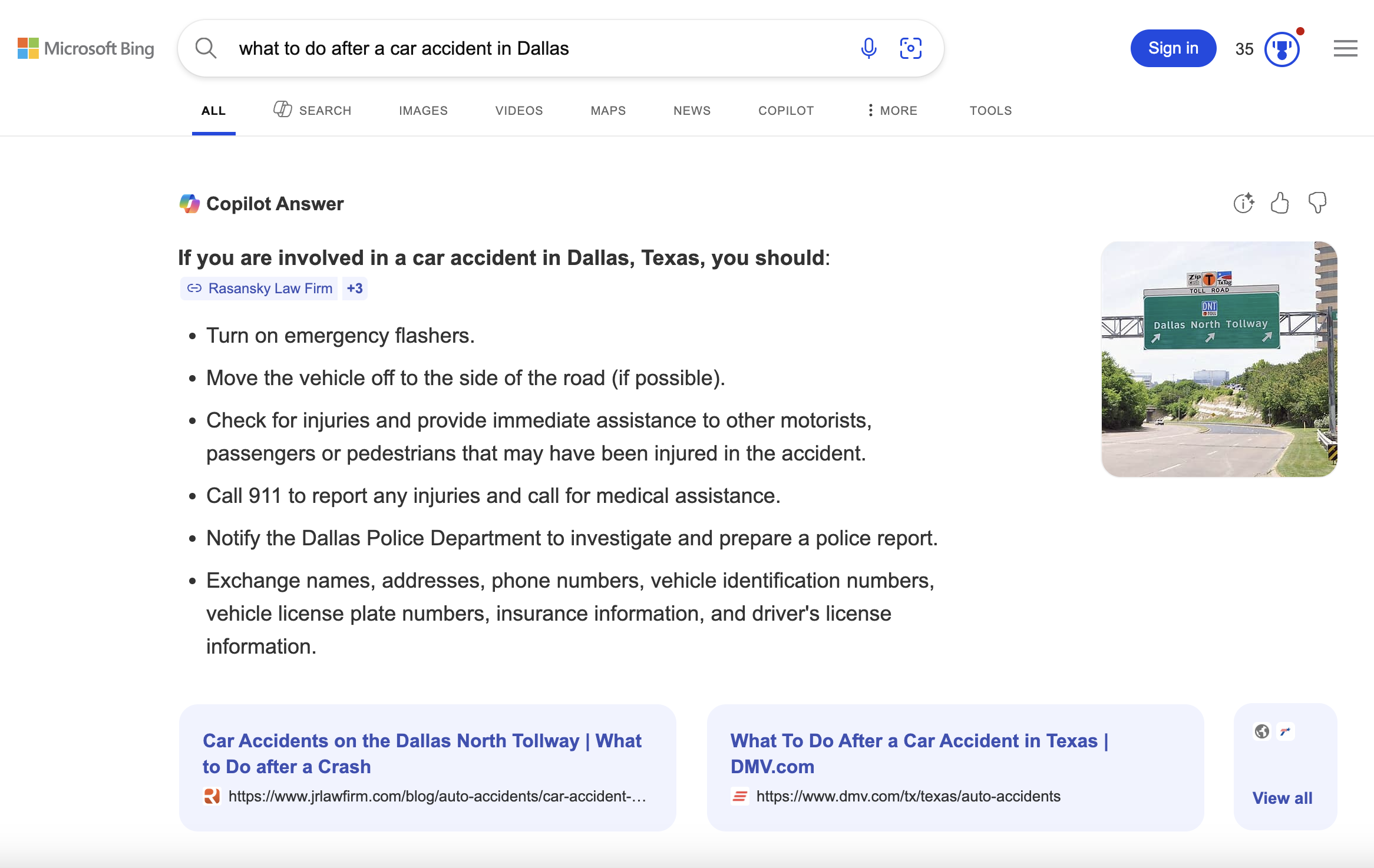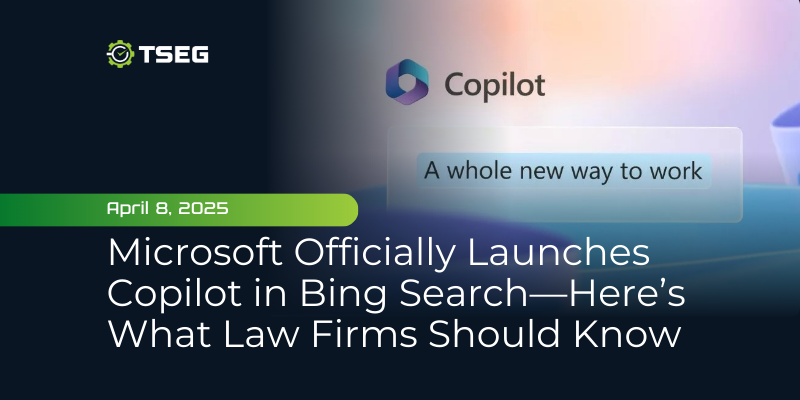Microsoft Officially Launches Copilot in Bing Search—Here’s What Law Firms Should Know
Posted on Tuesday, April 8th, 2025 at 1:30 pm
Bing Search Is Getting Smarter—Fast
Microsoft just flipped a major switch. Bing search results now come with Copilot—the company’s AI assistant—baked directly into the main results page. This isn’t a test or limited feature. It’s live, and it changes how people interact with search in a big way.
Until now, Copilot sat off to the side, offering AI-generated responses as an optional experience. But with this update, those summaries take center stage, appearing before traditional links. For law firms that rely on search to bring in high-value cases, that’s a big deal.
It means potential clients may find what they’re looking for without ever scrolling to the organic listings. That coveted #1 spot on Bing could now sit beneath a long, AI-crafted answer sourced from various sites—maybe yours, maybe not.
This move confirms Microsoft sees AI not as an add-on, but as the new starting point for search. And with Bing integrated into millions of devices, especially in professional environments, firms can’t afford to treat it as a secondary player.
AI Answers Are Replacing Traditional Rankings
Search used to be simple: climb the rankings, land on page one, and bring in clicks. But with Copilot now embedded directly into Bing’s main results, that approach just became less straightforward.
The AI-generated answer—Copilot’s summary—often appears above every organic result. It’s not off to the side. It’s the first thing users see. For law firms, this means even a top-ranked website could be visually buried beneath a long AI-written block that pulls from multiple sources.

The summary doesn’t look or feel like an ad, and it doesn’t behave like a standard search snippet. It dominates the screen. And that raises a real concern: if potential clients get what they need from Copilot’s response, they may never make it down to your link at all.
This change redefines what it means to “rank.” Visibility now depends on whether your content is included in the AI’s answer—not just where your page lands in traditional search results.
What Happens to Local Listings and Legal Directories?
Local listings and directories aren’t immune to Bing’s shift. Firms that depend on visibility through Bing Places, Google Business Profiles, or legal directories like Avvo, Justia, and FindLaw may see fewer clicks if Copilot’s summary answers the user’s question.
When someone searches “what to do after a car accident in Dallas,” Copilot might respond with a paragraph drawn from multiple sources—none of which mention your firm. If you’re not in that summary, you’re not in the conversation, even if you would’ve ranked high in the past.
Directory placement and local SEO still matter—but the path to front-row visibility is no longer crystal clear. If you’re not part of the content being pulled into Copilot’s answer, you risk being overlooked.

What Law Firms Should Be Doing Right Now
Search is changing faster than most firms realize, and not all SEO providers are preparing accordingly. Copilot isn’t an experiment; it’s Bing’s new default. And that means legal marketing strategies need to address these changes.
First, content must be written in a way that AI can easily process and summarize. That means optimizing it with clear structure, focusing your scope with concise answers, and earning trust with factual authority. Rambling blog posts filled with fluff and fully opinionated won’t cut it—AI tools like Copilot are scanning for information they can trust and then cite for users.
Second, technical SEO matters more than ever. Schema markup, metadata, and structured data help AI understand what your pages are about and help decide when to include them. If your content doesn’t speak the language of search engines, you won’t make it into these summaries. However, don’t be tempted to overdo it. Remember that content should be written primarily for humans, not for web crawlers – which brings us to our third item.
Third, long-form content needs to serve dual purposes: informing the human reader with high quality, unique and insightful content as well as feeding the AI with formatted structure. This means putting a system in place for humanizing all your website content, ensuring your website isn’t loaded with AI generated content like millions of others that will be penalized by algorithm updates targeting spammy websites. This is about writing smarter, not shorter.
The end goal is getting your firm’s name and content embedded in the AI response—not just floating somewhere in the organic rankings.
Stay Ahead Before the Rules Rewrite Themselves
Clients searching online aren’t starting with a list of links anymore—they’re being handed answers by AI. When that happens, the law firms getting mentioned are the ones who’ve optimized for searchers that use the most advanced features. Bing’s integration of Copilot acts as a reset on how visibility works.
At TSEG, we’re already building marketing strategies with this in mind. We help trial firms create content that doesn’t just rank, but earns its way into AI-generated results. From technical SEO to content frameworks that AI tools understand, our team makes sure your firm shows up where it counts—at the top of the answer, not buried underneath it.
These changes aren’t years away. They’re already live. The firms that move first will have the edge. Contact us today to learn more.
